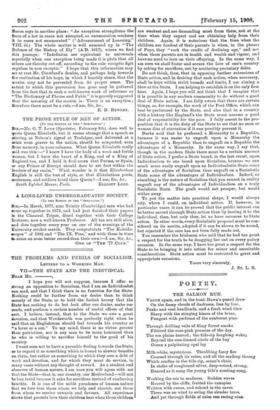THE PROBLEMS AND PERILS OF SOCIALISM. LETTERS TO A WORKING
MAN.
VII.—THE STATE AND THE INDIVIDUAL.
BEAR Mn.
I hope you will not suppose, because I offer so strong an opposition to Socialism, that I am an Individualist sun mad, and that I think there is no function for the State. Nothing could be further from my desire than to think meanly of the State, or to hold the foolish heresy that the State has nothing to do but look after our drains, make our soads, and perform a certain number of useful offices of that sort. I believe, instead, that to the State we owe a great ievotion, and that Wordsworth was perfectly right when he said that an Englishman should feel towards his country as "a lover or a son." To my mind, there is no virtue greater than patriotism, nor is any man to be more honoured than be who is willing to sacrifice himself to the good of his country.
I want men not to have a parasitic feeling towards the State, Or to regard it as something which is bound to shower benefits on-them, but rather as something to which they owe a debt of work and devotion, and for which they must do service, in many cases without any thought of reward. As a student and observer of human-nature, I am sure you will agree with me that the State—that is, our country, our Motherland—will not be less loved because it asks for sacrifices instead of conferring benefits. It is one of the noble paradoxes of human nature that we love best those whom we help and cherish, not those from whom we receive rewards and favours. All experience shows that parents love their children best when those children
are weakest and are demanding most from them, not at the time when they expect and are obtaining help from their children. Again, it is notorious that the time when the children are fondest of their parents is when, in the phrase of Pope, they "rock the cradle of declining age," and not when those parents are in health and wealth and vigour, and have no need to lean on their offspring. In the same way, I am sure we shall foster and secure the love of one's country by asking for sacrifices, not by scattering pecuniary doles.
Do not think, then, that in opposing further extensions of State action, and in desiring that such action, when necessary, shall be kept within strict bounds and limits, I am aiming a blow at the State. I am helping to establish it on the only firm base. Again, I hope you will not think that I imagine that it is possible in any modern community to do without a good deal of State action. I am fully aware that there are certain things, as, for example, the work of the Post Office, which can best be performed by the State, and also that in a country with a history like England's the State must assume a good deal of responsibility for the poor. I fully assent to the pro- position that it is the duty of the State to see that no man or woman dies of starvation if it can possibly prevent it.
Burke said that he preferred a Monarchy to a Republic, because it was easier to engraft upon a Monarchy the advantages of a Republic than to engraft on a Republic the advantages of a Monarchy. In the same way, I say that, though in the modern State there must be a certain amount of State action, I prefer a State based, in the last resort, upon Individualism to one based upon Socialism, because we can much more easily engraft upon an Individualistic State some of the advantages of Socialism than engraft on a Socialistic State some of the advantages of Individualism. Indeed, so absorbing is the nature of Socialism that you cannot in reality engraft any of the advantages of Individualism on a truly Socialistic State. The graft would not prosper, but would wither away.
To put the matter into practical shape, I would always rely, where I could, on individual action. If, however, in particular cases it can be proved that the public interest can be better served through State action than by leaving it to the individual, then, but only then, let us have recourse to State action. In other words, every Socialistic proposal must be con- sidered on its merits, adopted if it can be shown to be sound, but rejected if the case has not been fully made out.
You remember the Irishman who said that he had too great a respect for the truth to be dragging her out on every paltry occasion. In the same way, I have too great a respect for the State to be bringing it into action for minor and unsuitable considerations. State action must be restricted to great and appropriate occasions.
Yours very sincerely, Sr. L. S.




































 Previous page
Previous page